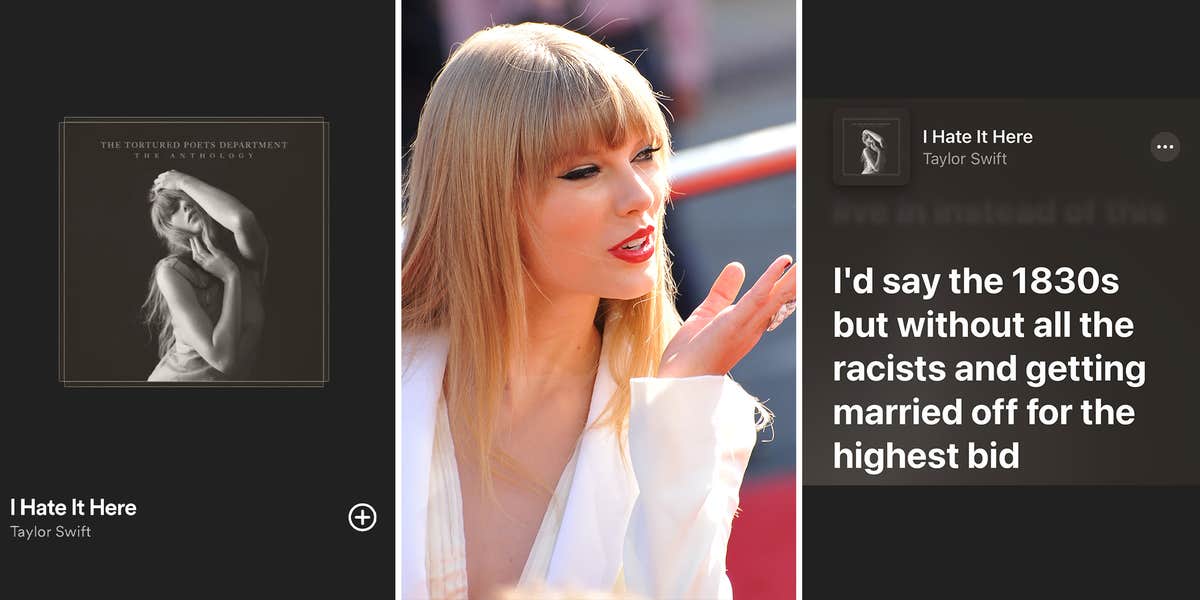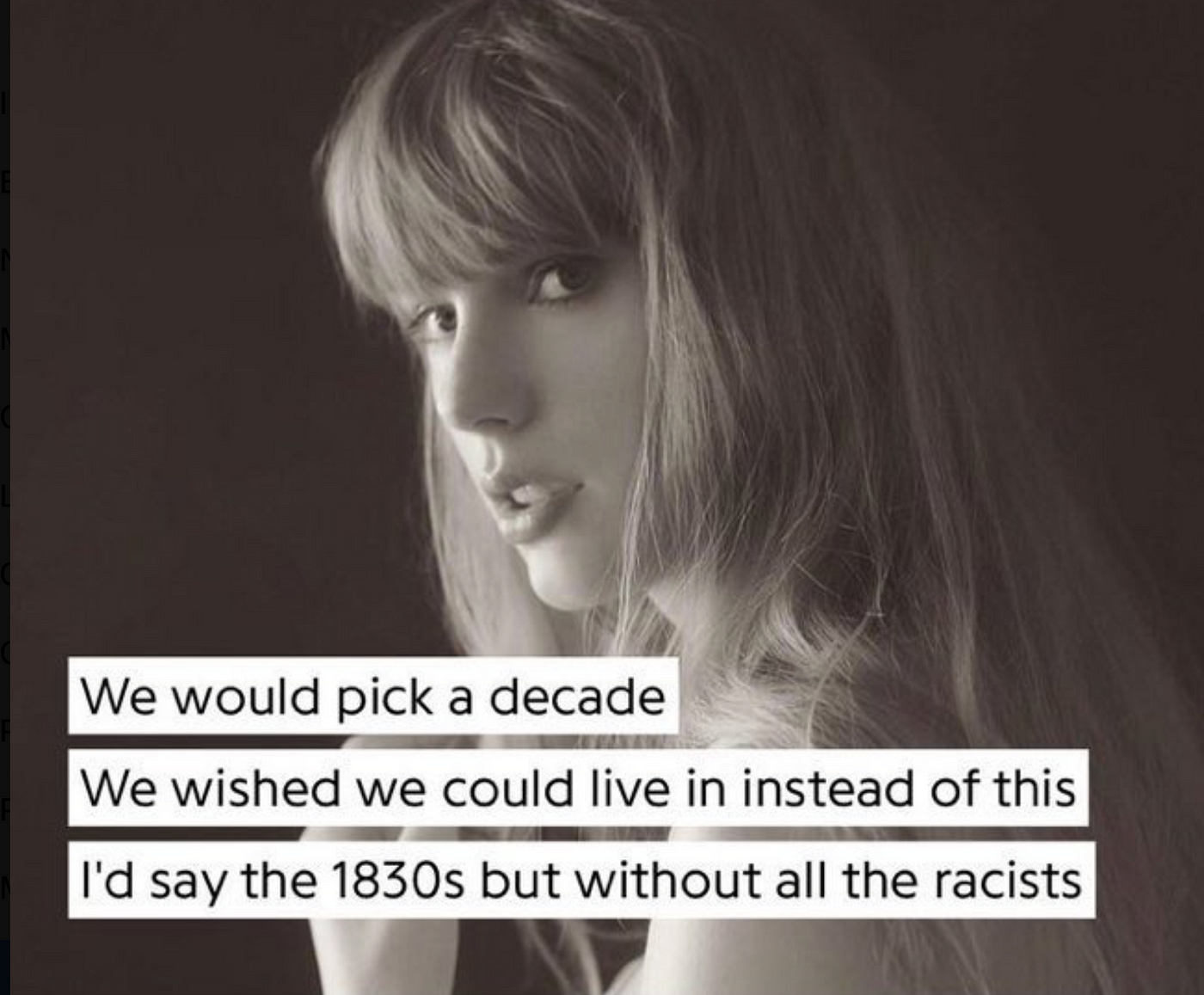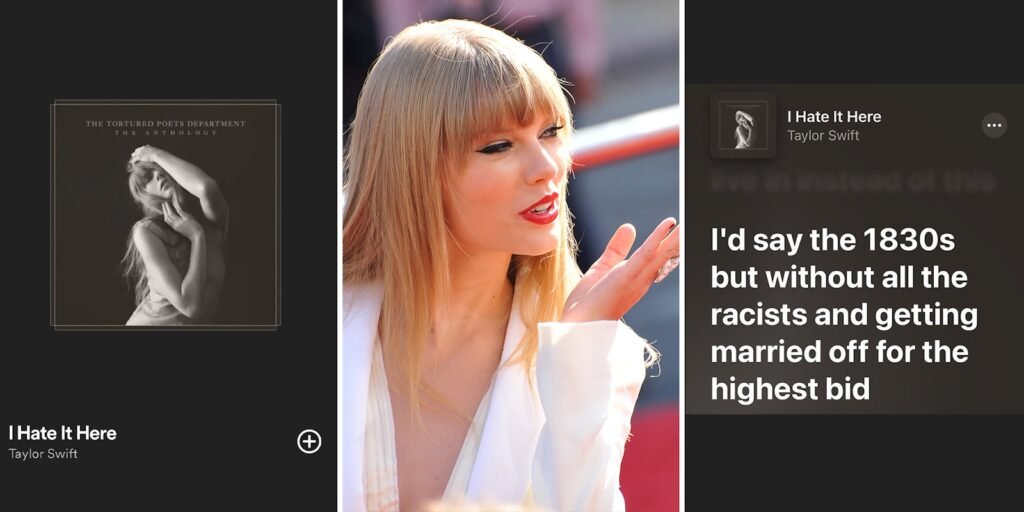Taylor Swift’s lyric in the song “I Hate It Here” stating “all the racists” has drawn controversy, but it is important to note that the line is not racist. Rather, it addresses the desire for a past that is free from racism and bigotry.
The lyric aims to highlight the romanticization of the past while acknowledging the need for progress and equality.

Credit: www.reddit.com
Table of Contents
ToggleTaylor Swift’s ‘i Hate It Here’ Lyrics
In Taylor Swift’s song “I Hate It Here,” the lyric “all the racists” sparked controversy. Some believe it confronts racism, while others find it problematic. Taylor Swift’s bold lyrics provoke discussions on race and societal issues.
Controversial References Explored
Taylor Swift’s song “I Hate It Here” sparked controversy due to a specific lyric that mentions “all the racists.” This sparked debate and divided opinions among fans and critics.
Lyric Interpretations And Reactions
Some fans interpreted the lyric as a bold statement against racism, while others criticized it, claiming it was inappropriate and could be misinterpreted. The reactions were mixed, with some praising Swift’s courage and others expressing concern about the potential impact of the lyric.
Historical Context Of The Lyrics
The historical context of the lyrics in question must be carefully considered, as Taylor Swift’s “I Hate It Here” has faced controversy over the line “all the racists”. It’s important to understand the intended message and the broader context of the song to form a balanced perspective.
The Role Of Nostalgia In Music
Taylor Swift’s latest release “I Hate It Here” has sparked controversy over its lyrics, particularly the line “all the racists”. However, it’s important to examine the historical context of the lyrics and the role of nostalgia in music. Many artists use nostalgia to evoke positive emotions and create a sense of longing for a simpler time. However, nostalgia can also be used to romanticize a past that was not as idyllic as we remember. In the case of Taylor Swift’s lyrics, it’s possible that she is using nostalgia to criticize the current state of society by implying that in the past, racism was not as prevalent.
Confronting Racism In Art
While Taylor Swift may have had good intentions with her lyrics, it’s important to recognize that racism has been a pervasive issue throughout history and continues to be a problem today. It’s not enough to simply acknowledge the existence of racism; we must actively work to confront and dismantle it. This includes examining our own biases and privileges, educating ourselves on the experiences of marginalized groups, and using our platforms to amplify marginalized voices.
As artists, we have a responsibility to create art that is inclusive and does not perpetuate harmful stereotypes or perpetuate systemic oppression. It’s important to continue having these difficult conversations and pushing for progress towards a more equitable and just society.
Public Reaction And Backlash
Public reaction and backlash erupted over Taylor Swift Racist Lyric in her song, sparking heated debates. Swift faced criticism for the controversial line, stirring discussions on racism and accountability in the music industry.
Fans’ Perspectives
Upon the release of Taylor Swift’s song “I Hate It Here,” fans expressed a range of reactions to the controversial lyric. Some defended Swift, interpreting the line as a critique of racism. Others, however, felt disappointed and concerned, believing that the lyric was insensitive and trivialized the issue of racism. The polarized responses from fans sparked heated debates on social media platforms and within fan communities.
Critic And Activist Responses
Critics and activists were quick to address the racially charged lyric in Taylor Swift’s song. Many prominent voices in the music industry and social justice movements condemned the lyric, emphasizing the importance of responsible and respectful representation in art. Activists highlighted the potential impact of such lyrics on perpetuating harmful stereotypes and perpetuating racial prejudice. Additionally, they called for meaningful accountability and a deeper understanding of the impact of words and imagery in popular culture.
Impact On Taylor Swift’s Reputation
Taylor Swift’s reputation has been impacted by the controversy surrounding her alleged racist lyric in the song “I Hate It Here. ” The line has sparked backlash and debate, highlighting the importance of addressing racism in the music industry.
Influence On Fan Base
Taylor Swift’s racist lyric in the song “I Hate It Here” has undoubtedly had a significant impact on her fan base. Many fans were shocked and disappointed by the inclusion of such a controversial line in her music. Some fans have expressed their concern and frustration on social media platforms, questioning Taylor Swift’s intentions and whether she truly understands the gravity of the issue. This controversy has led to a divide among her fan base, with some continuing to support her and others distancing themselves from her music.
Media Coverage And Analysis
The media coverage surrounding Taylor Swift’s racist lyric has been extensive. News outlets, both mainstream and entertainment-focused, have reported on the controversy, sparking discussions and debates among journalists, music critics, and the general public. Many have analyzed the implications of the lyric, questioning whether it was a deliberate attempt to make a statement or simply a careless oversight. This incident has drawn attention to the role of artists and their responsibility in promoting inclusivity and combating racism within their work.
Overall, the impact on Taylor Swift’s reputation has been significant. While some fans have remained loyal, others have been disillusioned by her insensitivity and have distanced themselves from her music. The media coverage and analysis have further contributed to the discussion surrounding racism in the music industry and the responsibilities of artists. It remains to be seen how Taylor Swift will address this controversy and whether she can regain the trust and support of those who feel betrayed by her choice of lyrics.
The Broader Conversation On Racism
Taylor Swift’s recent release “I Hate It Here” has come under fire for its racially charged lyrics. While some defend the line “all the racists and their cigarettes,” others argue that it perpetuates harmful stereotypes and trivializes the issue of racism. However, this controversy has sparked a larger conversation about the role of the music industry in addressing racism and the societal impact of racially charged language.
Music Industry’s Role
The music industry has a powerful platform to influence public opinion and drive social change. As such, it has a responsibility to use this platform to combat racism and promote inclusivity. This includes holding artists accountable for their words and actions, as well as actively seeking out and promoting diverse voices and perspectives.
Furthermore, the industry must work to address its own history of racism and discrimination. From the exploitation of black artists in the early days of rock and roll to the ongoing underrepresentation of people of color in executive positions, the music industry has a long way to go in terms of promoting equity and justice.
Societal Impact Of Racially Charged Language
The use of racially charged language, even in the context of art, can have a significant impact on society. It can perpetuate harmful stereotypes, normalize discriminatory behavior, and make marginalized communities feel unsafe and unwelcome.
At the same time, the controversy around Taylor Swift’s lyrics demonstrates the power of language to spark important conversations and bring attention to issues that might otherwise go unnoticed. It is up to all of us to use this moment to engage in meaningful dialogue about racism and to work towards a more just and equitable society.

Credit: www.dailydot.com
Defenses And Support For Taylor Swift
Taylor Swift has been facing backlash over the lyrics in her song “I Hate It Here”, specifically the line “All the liars are calling me one / Nobody’s heard from me for months / I’m doing better than I ever was, ’cause” followed by “All the cool kids / They’re still being mean”. Critics are claiming that the line “All the liars are calling me one” is racist and offensive towards the Black community. However, there are several defenses and support for Taylor Swift that are worth considering.
Artist Intentions
One of the main defenses for Taylor Swift is her intentions as an artist. Swift has been known for using her music to express her personal experiences and emotions. In this case, the lyrics in “I Hate It Here” are believed to be inspired by her own experiences with cancel culture and online harassment. The line in question is not meant to be racist, but rather a commentary on how people twist words and actions to fit their own narratives.
Support From The Creative Community
Taylor Swift has also received support from several members of the creative community, including her fans and fellow musicians. Many have pointed out that the line in “I Hate It Here” is being taken out of context and that Swift is not a racist. Some have even gone as far as to say that the backlash against Swift is a result of cancel culture and that people are too quick to jump to conclusions without understanding the full context.
In conclusion, while there is certainly a controversy surrounding Taylor Swift’s lyrics in “I Hate It Here”, it is important to consider both sides of the argument. While some may see the line in question as racist, others argue that it is being taken out of context and that Swift’s intentions were not to offend anyone. Ultimately, it is up to each individual listener to decide for themselves whether or not they believe the criticism against Taylor Swift is justified.
The Intersection Of Art And Social Issues
Art has always played a powerful role in reflecting and commenting on the social issues of its time. From visual arts to literature, and even to music, artists have used their platforms to express their thoughts, provoke discussions, and bring attention to important topics. Taylor Swift, one of the biggest names in the music industry, is no stranger to using her music as a means of addressing social issues. However, with the release of her song “I Hate It Here,” she faced controversy over a potentially racist lyric.
Challenges Of Addressing Sensitive Topics
When artists delve into sensitive topics such as racism, they must navigate a challenging landscape. The power of their words can be both impactful and divisive. One of the challenges faced by artists like Taylor Swift is the interpretation of their lyrics. A single line taken out of context can spark controversy and misrepresent the intended message. In the case of the lyric in question, the line “all the racists” has been scrutinized for potentially perpetuating stereotypes or being insensitive.
Benefits Of Social Commentary In Music
Despite the challenges, there are significant benefits to incorporating social commentary into music. Artists have the ability to reach a wide audience and influence public opinion. By addressing social issues, they can raise awareness, encourage conversations, and inspire change. Taylor Swift has been vocal about her support for social justice movements and has used her platform to shed light on various issues. In this instance, the lyric in question can be seen as Swift’s attempt to highlight the presence of racism in society, rather than endorsing it. It serves as a commentary on the need to acknowledge and confront racism, rather than ignoring its existence.
Artists like Taylor Swift have a responsibility to use their influence wisely and consider the impact of their words. While controversy may arise, it is crucial to engage in thoughtful discussions about the intersection of art and social issues. By doing so, we can foster a greater understanding and work towards a more inclusive society.

Credit: medium.com
Moving Forward: Lessons Learned
In Taylor Swift’s song “Moving Forward: Lessons Learned,” she addresses a controversial lyric that has been falsely labeled as racist. Swift’s intention is to highlight the importance of confronting racism and promoting inclusivity through love and music. Join her in spreading this powerful message against racism.
Swift’s Response To The Controversy
Taylor Swift’s response to the controversy surrounding the “all the racists” lyric in her song “I Hate It Here” was swift and direct. In a statement, she acknowledged the concerns raised by her fans and the public, expressing regret for any hurt caused by the lyric. She emphasized her commitment to learning from the experience and using her platform to promote inclusivity and understanding.
This incident prompted Taylor Swift to reevaluate her songwriting process and the impact her lyrics might have on her diverse audience. She recognized the importance of being mindful of the words she chooses and their potential implications, especially in today’s social and political climate.
Future Implications For Artists
The controversy surrounding Taylor Swift’s lyric has broader implications for artists in the music industry. It serves as a reminder of the responsibility that comes with wielding influence and the need to consider the potential impact of their creative expression. Artists must be cognizant of the power of their words and the diverse perspectives of their audience.
Furthermore, this incident highlights the importance of engaging in meaningful conversations about race, discrimination, and social justice. Artists have the opportunity to use their platforms to promote positive change and advocate for inclusivity and equality.
Frequently Asked Questions
What Is The Most Unpopular Taylor Swift Song?
The most unpopular Taylor Swift song is “It’s Nice to Have a Friend. ” It is a divisive song that people either love or skip.
How Many Songs Does Taylor Swift Have?
Taylor Swift has a total of more than 200 songs in her discography.
How Much Is Taylor Swift Worth?
Taylor Swift is worth an estimated $400 million, making her one of the wealthiest musicians.
Where Can I Get Taylor Swift’s New Album?
You can find Taylor Swift’s new album on major streaming platforms like Spotify, Apple Music, and Amazon Music. You can also purchase or add the album to your collection now.
Conclusion
The controversy surrounding Taylor Swift’s “racist” lyric in her song “I Hate It Here” is highly subjective. While some argue that the line perpetuates racism, others argue that it is merely a commentary on the past. It is important to consider the context and intent behind the lyrics before passing judgement.
Ultimately, it is up to the listeners to interpret the meaning and message of the song.

